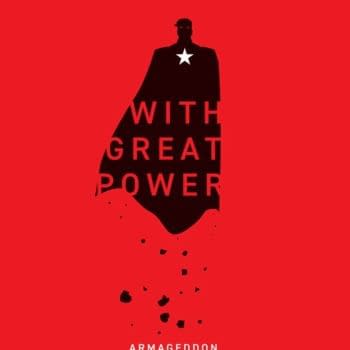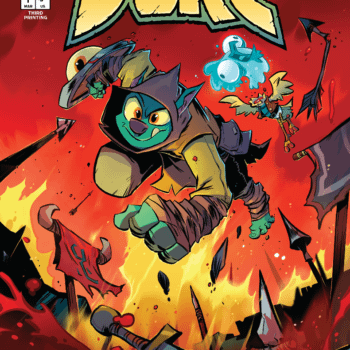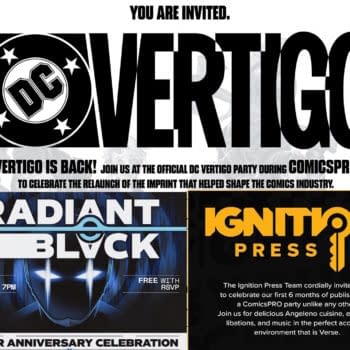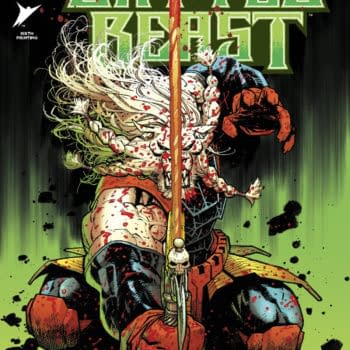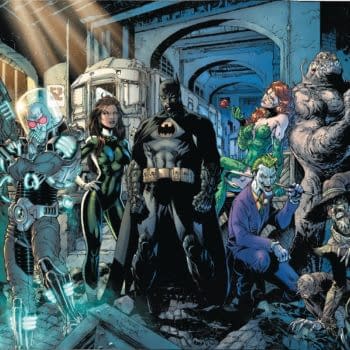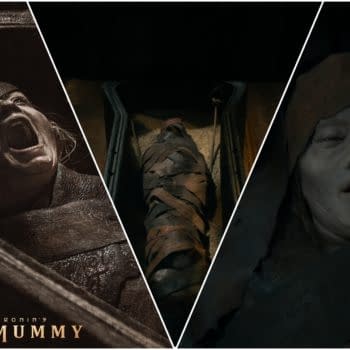Posted in: Look! It Moves! by Adi Tantimedh, Movies | Tagged: 007, entertainment, film, james bond, spectre
The James Bond Funhouse of SPECTRE – Look! It Moves! by Adi Tantimedh
Adi Tantimedh writes,
It shouldn't be a surprise that Spectre is a massive hit already in its opening week.
James Bond movies are an event, and a particular ritual for many people, especially if they're British. For my British friends, the release of a new Bond film often feels like an act of worship at the altar of a fantasy of the male ideal, a macho fantasy of conspicuous consumption, drinking, shagging and killing without consequence.
The longer the gap between the movies, the greater the anticipation, and Bond and Star Wars are the two franchises that are critic-proof. They will make tons of money at the box office no matter what the critics say, and there have been a lot of reviews critical of Spectre. It's still going to make a kajillion dollars.
A James Bond movie is a machine, a well-oiled machine that delivers exotic tourist locations, women, gadgets, explosions, fights and bloodless killings, all designed to make money. It also serves as a kind of soft propaganda for British power in an age where Britain no longer has an empire. Bond films create a fantasy universe all their own, only barely reflecting what spying is really about. Bond in the movies is only nominally a spy – he barely goes about gathering intel. He's really a hitman who carries out his assignments in the loudest, most destructive ways possible. Sam Mendes directs like this is the most elegant, upmarket avant-garde exercise in state-of-the-art filmmaking imaginable, choosing the most interesting, most surprising ways to film people as their move across the screen. The direction here constantly surprises the eye, keeps the brain on its toes with unexpected angles and compositions that make the movie a tool for film students.
Thematically, Spectre is a culmination of not only the movie series but also the Daniel Craig era. Starting with Casino Royale, the series rebooted itself in the wake of the Jason Bourne movies in an attempt to stay contemporary and relevant. Here was a Bond that was darker, grimmer and grittier, closer to the doomed character of the novels, updated to the 21st Century. The movies continued to have the series' trademark motifs of women, exotic locations but were less jokey and the violence was nastier, reflecting the darker, grittier hero with his air of doomed existential melancholy. They were now an existential journey of the character where the series previously didn't really feel the need to give Bond an inner life. The movies actually presented the idea that Bond was not a man you necessarily wanted to be – his life was empty and miserable, full of emotional dysfunction and pathology that drove him to be a killer. Things were now personal for him and he has to go rogue so that that he's now a rebel and outsider on the verge of becoming obsolete with age and changing times, with death his only endgame.
Spectre is an attempt to put the toys back in the box, to bring back the levity and fun of the series before Craig took over. It sets out to be the ultimate Bond film while also bringing some closure to the story of Craig's version of Bond. It starts to embrace the series' absurd closed universe, presenting a sense of a Greatest Hits of the movie series over fifty years. Bond attending a funeral in Rome echoes the opening of Thunderball. The journey on a luxury train that climaxes in a brutal fight with an unstoppable killer pastiches From Russia With Love. The formal, menacingly civilised invitation to the villain's lair references a plot point in Dr. No, its remote desert location echoes even Quantum of Solace. The overblown chase in the Swiss mountains between a plane and the villains' cars are reminiscent of the crazy setpieces from the Roger Moore and Pierce Brosnan eras. All while still trying to be a psychodrama about Bond's personal journey. It's not really about England or spying but the hero tryig to resolve his mommy and daddy issues. The current state of Hollywood screenwriting demands that every story has to be the hero's personal journey, no matter how much the audience might roll their eyes at the contrivance.
At this point, Bond has become kitsch. It can try to court relevance with a muddled message against widespread surveillance in favour of face-to-face assassinations. It can continue to imbue Bond with an inner life even as it tries to redeem him and pull him back from the darkness of the last three movies to re-establish the series' lighter escapist tone, but in the end, it's become its own closed loop of product placement, virtual tourism, shagging and shooting, and explosions, a ritual that moviegoers partake in a kind of collective pop culture altar that exists in its own bubble, the dream of England still possessing a brutish, blunt instrument that can be set loose in the world. Spectre wants to admit to its own silliness and take itself seriously at the same time. Critics can criticise that all they want, but every boy will till want to buy tickets to that ride. And the next one. And the next. Spectre is about safeguarding that business model.
Double-O nothing at lookitmoves@gmail.com
Follow the official LOOK! IT MOVES! twitter feed at http://twitter.com/lookitmoves for thoughts and snark on media and pop culture, stuff for future columns and stuff I may never spend a whole column writing about.
Look! It Moves! © Adisakdi Tantimedh







